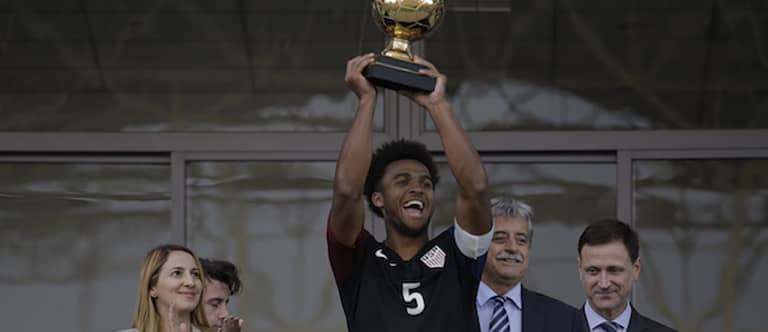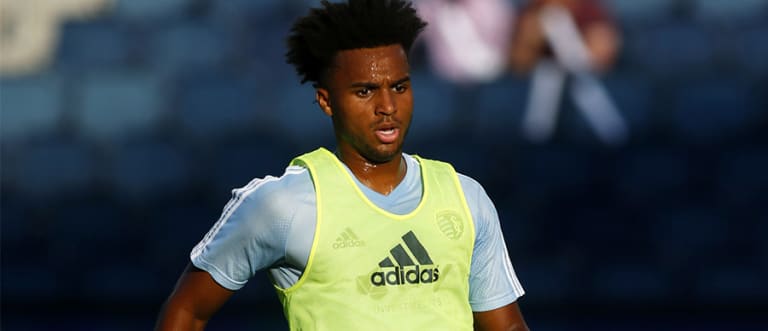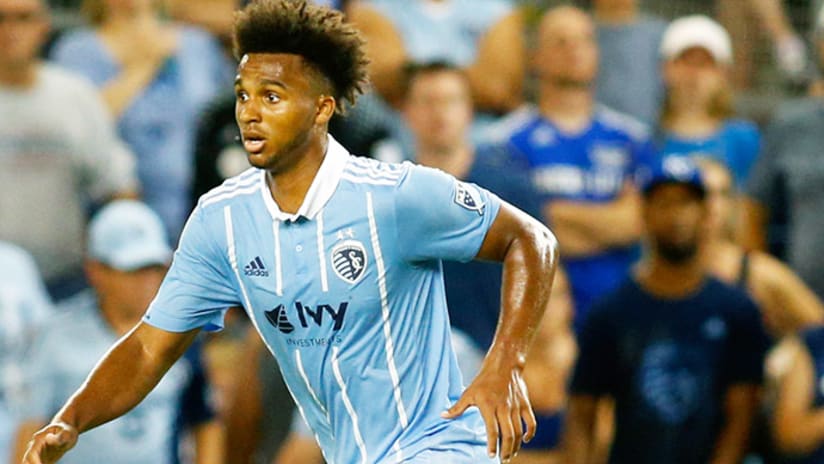It’s been over a week since news broke that US youth national team defender Erik Palmer-Brown will leave Sporting Kansas City this winter to join Manchester City on a four-and-a-half-year deal, and there are still a good number of people wondering how SKC let the incredibly promising center back walk for free.
The answer lies mainly in the mechanics of transfer windows and the impact one near-miss offer can have on a club and a player.
Though he’s never played many minutes in MLS since signing as a 16-year-old in August 2013, Palmer-Brown is a world-class prospect. The 20-year-old has been consistently excellent for US youth national teams, winning player of the tournament at the CONCACAF Under-20 Championship in February and captaining the US to the quarterfinals of the Under-20 World Cup in June. He’s a stout defender, calm on the ball and reads the game very well for his age.

Players with his sort of pedigree usually command big transfer fees, and SKC have had significant offers.
They reportedly turned down a $1 million bid from Juventus for Palmer-Brown when he was a 17-year-old in 2014, and, according to a source, the club wanted to transfer him to Portuguese club Porto last winter before a potential deal fell through.
Palmer-Brown spent 2016 on loan at Porto, helping their reserve squad win the second-division title in May and training with the club’s first-team despite missing a good portion of the year due to injury. All parties were interested in making the move permanent, but financial difficulties prevented Porto from meeting SKC’s asking price.
That development ultimately left Sporting vulnerable to losing Palmer-Brown for free, giving the player a multitude of options with his initial MLS contract set to expire at the end of 2017.
In addition to potentially re-signing with SKC or leaving the club via transfer fee during the summer, Palmer-Brown now also had the option of waiting until after July 1 to sign a pre-contract and join a foreign club in January 2018 without the need for a transfer fee. That's because FIFA allows players to sign a pre-contract with any club in the world up to six months before the end of their current deal.
But at that point, leaving SKC in a paid transfer never would’ve made much sense. Even with his strong performance at the FIFA Under-20 World Cup, there was never much incentive for a foreign club to invest seven figures to acquire him in the summer. Plus, Palmer-Brown was never going to be an immediate contributor at any of the big clubs chasing his signature. Teams like Manchester City, who will assuredly loan him elsewhere in Europe to start his deal, would be more than happy to wait, save a few bucks and get him to camp in January 2018.
From Palmer-Brown’s perspective, seeking a pre-contract likely lengthened his list of suitors since no transfer fee would be necessary. He knows how important his next stop is for his budding career. Making himself available for free ensured that no club would lose interest because of a transfer fee. He’ll have to wait a few extra months before joining his new club, but that’s a small price to pay in exchange for maximizing his list of potential destinations.
All of that spelled trouble for SKC. A source confirmed that the club attempted to sign him to a contract extension, but they couldn’t compete with Manchester City’s offer. Instead of inking him to a long-term deal or selling him for a substantial fee, they’ll now lose Palmer-Brown for nothing. That’s a tough blow, and a potential lesson for the club as they onboard newly-signed Homegrown teenagers Gianluca Busio (signed Aug. 25) and Jaylin Lindsey (signed Sept. 14).


ExtraTime Live: US Open Cup final postgame show!
Watch ExtraTime Live on Wednesday at 11:15 PM ET. Join Andrew Wiebe, Matt Doyle and David Gass as they break down the all the action between Sporting KC and the Red Bulls, bringing you exclusive access via interviews and access to locker-room celebrations! Set a reminder to watch














